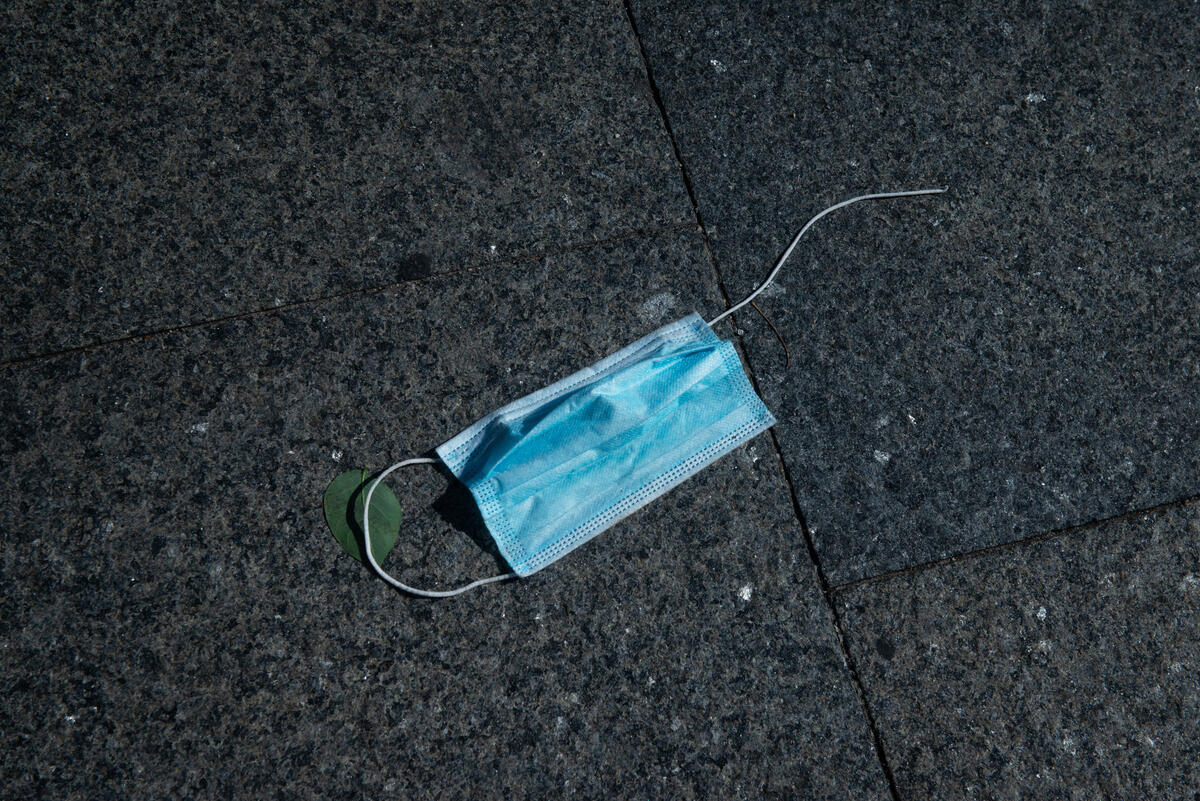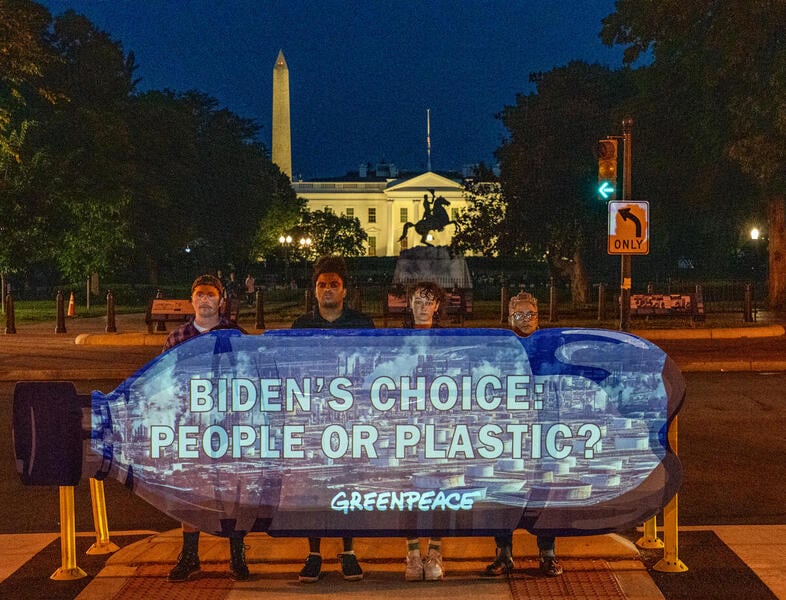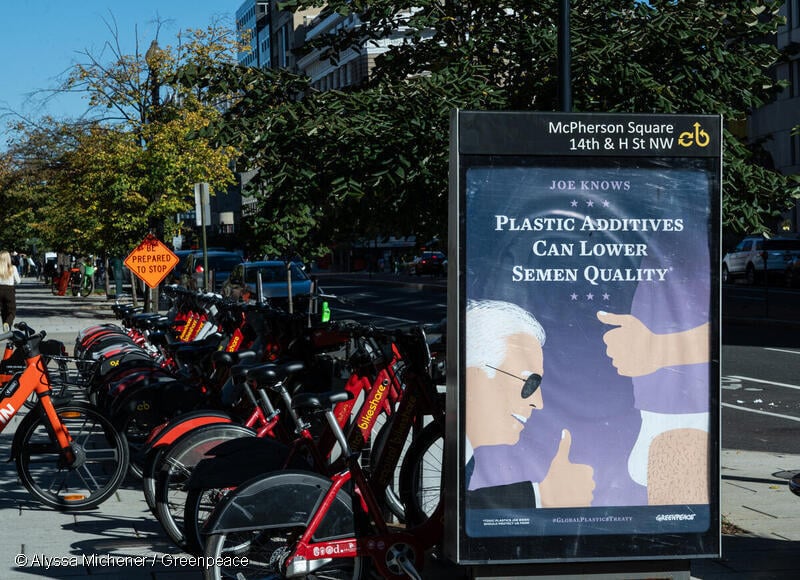
Quotes from global health experts on the mounting concerns around disposable, single-use PPE and how it will impact our long-term health and the environment.
The Americas
Dr. Jodi Sherman, associate professor of Anesthesiology and Epidemiology and Director of the Program on Healthcare Environmental Sustainability with Yale University in the United States, said: “The general public should be using reusable face masks and performing routine laundering at home. It is unnecessary for personal safety, and harmful to planetary health to use disposable gloves for shopping. Hand sanitizer or soap and water are both safe and effective.”
Dr. Lori Hoepner, assistant professor of environmental and occupational health sciences at SUNY Downstate Health Sciences University in the United States, said:
“While the tragedy of the COVID-19 pandemic has overshadowed our immediate environmental concerns, we cannot discount the existing research associating exposures to the myriad of plastic chemicals with adverse health outcomes such as obesity, metabolic disease, cardiovascular disease, asthma, and neurodevelopmental concerns. The increased reliance on single-use plastics will result in increased exposure to these chemicals, increased plastic waste, and an amplification of the existing cyclical impact on ecology and human health. Unless society can unite to stem the tide of increased plastic use and promote safe reusable options, the unintended consequences of single-use plastic may continue to fall on vulnerable populations and exacerbate existing health disparities. As we emerge from the shockwaves of COVID-19 and we become better informed, society must re-commit itself to the reduction of plastic use in favor of reusable materials, particularly in consumer goods, but also by actively seeking safe reusable alternatives to plastic for proper personal protection from COVID-19.”
Dr. Nate Horwitz-Willis, assistant professor of public health and coordinator of public health practice at the Massachusetts College of Pharmacy and Health Sciences in the United States, said: “Environmental racism is part of the reason Black and Brown people are at the highest risk of illness and death during the COVID-19 pandemic. The hope to nurture with nature in communities of color is disproportionately eroded by institutional racial injustice, as is access to education, healthy food, clean air and water, and healthcare. Once the pandemic is over, it will be staggering to see the environment and public health in Black and Brown communities further degraded by contaminated PPE in our neighborhoods coupled with the lack of access to sanitary healthy spaces and places.”
Dr. Joe Vipond, emergency physician and interim president with the Canadian Association of Physicians for the Environment, said: “It’s important to remember, as we battle the life-threatening COVID crisis, that we also have concomitant existential issues with the plastics crisis, the extinction crisis, and the climate crisis, and that we need to be fighting all four at the same time. Which means recognizing that we can’t just ignore the single-use waste that we are generating to combat the former. Consider using soap and water instead of gloves, a reusable cloth mask instead of a disposable mask, and together we can save ourselves and the planet.”
Dr. Saulo Delfino Barboza, associate professor of the Health & Education Program at University of Ribeirao Preto in Brazil, said: “Our health depends on the health of our planet’s natural resources. Single-use plastic materials are contaminating our air, water, and soil and, therefore, harming our health. Breaking free from single-use plastics is now a matter of public health.”
Europe, the Middle-East, and Africa (EMEA)
Rico Euripidou, environmental epidemiologist with Groundwork in South Africa, said: “While some single-use PPE is necessary to stop the spread of COVID-19, it should be prioritised for healthcare and essential workers and disposed of safely in the best interest of the environment and communities. Most people can utilise reusable masks or gloves that can be washed, and that don’t contribute to our growing plastic waste stream.”
Dr. Lia Patsavoudi, professor of biology in the Department of Biomedical Engineering at the University of West Attica in Greece, said: “Viruses are not picky. However, due to various social and political reasons around the world, it is clear that COVID-19 has affected the poor disproportionately. It is the obligation of governments not only to provide free medical care for underprivileged communities but also to instruct people how to best protect themselves, without causing harm to our planet.”
Professor Mark Miodownik, MBE FREng, project lead of the Plastics Waste Innovation Hub at the University College London in the UK, said: “For general public use, reusable fabric masks are far preferable to single-use plastic masks. They reduce the environmental and health risks associated with the disposal of 66,000 tonnes of contaminated plastic waste that will be produced if everyone in the UK starts wearing single-use plastic masks. Reusable masks also significantly reduce the climate change impact of this new government rule.”
Professor Valérie D’Acremont, professor of tropical diseases and global health at the Centre for Primary Care and Public Health at the University of Lausanne in Switzerland, said: “I recommend reusable masks for the public, as long as they are made according to the current standard and used correctly. Their efficacy is sufficient enough to protect individuals amidst this pandemic. The aim is twofold — to reduce the impact on the environment and to avoid a further shortage of masks for healthcare professionals.”
Dr. Gerhard Eich, board member and former president of the Swiss Society for Hospital Hygiene/head of infectiology and hospital hygiene at the Hospital Triemli in Zurich in Switzerland, said: “To contain the pandemic, it’s immensely important that society consistently adheres to the rules of hygiene. Regarding masks, outside of the hospital, certified disposable masks are not absolutely necessary because exposure is much lower. I myself wear a reusable mask on public transport. Gloves are unnecessary outside the hospital. Instead, I recommend washing your hands before touching food or preparing meals.”
Asia Pacific (APAC)
Dr. Sharifah Norkhadijah Syed Ismail, senior lecturer with the Department of Environmental and Occupational Health at Universiti Putra Malaysia, said:
“A new challenge of the waste disposal system is the use of face masks among the general public. In the current practical context, masks that have been used by the public are disposed of as municipal solid waste. However, other issues arise if they are not properly disposed of. Certainly, this can affect the environment. Numerous reports have been circulated regarding the discovery of face masks and gloves along the coast, sea, and river. This is a threat to the flora and fauna.”
Dr. Chih-Chieh Chen, professor at the Institute of Environmental and Occupational Health Sciences at Taiwan University, said: “Only first-line medical personnel need high-standard masks. Places that we go in ordinary daily life are considered ‘lower risk.’ If people are in and out of ordinary places, the masks do not need to be changed every day, unless they are in high-risk environments such as hospitals.”
Dr. Geminn Louis C. Apostol, professor and lead environmental health specialist of the Ateneo School of Medicine and Public Health at Ateneo de Manila University in the Philippines, said: “While ensuring adequate access to PPE is paramount, the pandemic has exposed how both the medical and nonmedical community has an unnecessary and dangerous reliance on disposable, single-use materials. Inequitable access to PPE and information about how to stay safe has contributed to the disproportionate rates of infection in poor and minority communities. If medical masks are prioritized for healthcare workers, the general public can use cloth masks as a safe, cost-effective alternative. Widespread use of single-use PPE has resulted in enormous quantities entering waste management streams, contaminating both public spaces and natural environments and creating additional threats to public health and safety.”



